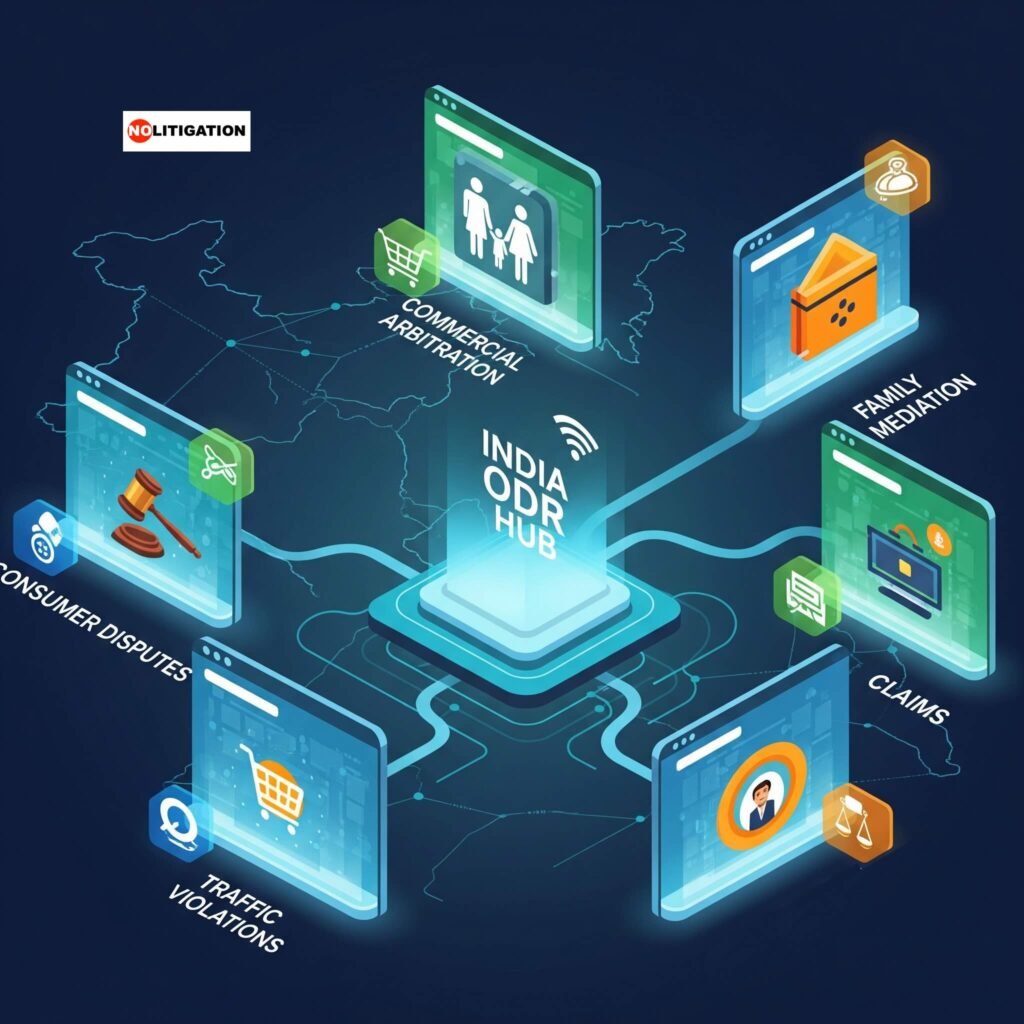Online dispute resolution portals in India (ODR portals in India) are transforming the way disputes are resolved by offering a fast, transparent, and accessible alternative to traditional litigation. These platforms leverage technology to enable parties to resolve conflicts efficiently from anywhere, helping alleviate the massive case backlogs in Indian courts and supporting digital transactions across sectors like finance, e-commerce, and securities markets.
What Are ODR Portals?
ODR portals are digital platforms that provide services such as online mediation, conciliation, and arbitration. By harnessing secure digital tools, ODR portals enable dispute parties to communicate, exchange documents, conduct hearings, and arrive at legally binding resolutions without appearing in person. Settlements or awards reached on these platforms are recognized by Indian law and can be enforced like court orders.
Growth and Role in India
India has seen rapid adoption of ODR, especially since 2023, as innovative platforms and government initiatives have made the process more credible and user-friendly. The introduction of the SMART ODR Portal in July 2023, backed by SEBI and major market bodies (NSDL, CDSL), marked a milestone in securities market dispute resolution. By early 2024, ODR platforms in India had successfully resolved over 500,000 cases, reflecting the growing trust and efficiency of these solutions.
Key Features of Leading ODR Portals
• Legally Enforceable Outcomes: Resolutions are recognized by courts and authorities, giving users immense confidence in the process. Read about the Legal Framework Supporting Online Dispute Resolution (ODR) in India
• Data-Driven Analytics: Automated tools track case progress, identify trends, and boost transparency.
• Accessibility: Disputes can be initiated and managed from anywhere, benefiting both individuals and businesses.
• Efficiency: Most disputes are resolved much faster than traditional litigation, sometimes in weeks rather than years.
• Sector-Specific Solutions: Financial services and e-commerce are among the biggest adopters, but ODR is also available for property, consumer, and contractual disputes.
• Affordability: Lower costs compared to court proceedings make ODR accessible to a broad spectrum of society, including marginalized groups.
ODR Portals in India

SMART ODR Portal (SEBI)
Launched by the Securities and Exchange Board of India (SEBI) in August 2023, the SMART ODR Portal is the flagship platform for online dispute resolution in the securities market. It is a collaborative effort by principal market infrastructure institutions (MIIs) such as NSE, BSE, NSDL, CDSL, MCX, and NCDEX, supported by empanelled ODR institutions including CADRE ODR, SAMA, Jupitice, CORD, Just Act, Presolv 360, and Webnyay. SMART ODR portal streamlines the dispute resolution process for investors and clients against listed companies, intermediaries, and regulated entities.
Website – smartodr.in
Key features include:
• Online conciliation and arbitration: Users can resolve disputes in a fully digital format, including document uploads, virtual hearings, and digital signatures.
• Integration with the SEBI SCORES Portal: Investors must first approach market participants directly and then escalate unresolved grievances to the SEBI SCORES portal; if dissatisfied, they can initiate resolution on the SMART ODR portal, ensuring a comprehensive grievance redressal path.
• Transparent process: Each complaint is tracked via a digital dashboard, with status updates and timelines marked for each stage—conciliation meetings are conducted within 21 days, and post-conciliation arbitration follows specific deadlines.
• Legal enforceability: Settlement agreements reached through SMART ODR portal have legal effect and can be enforced like arbitral awards by Indian courts.
• Mandatory enrolment: All listed companies, intermediaries, and regulated entities must participate, ensuring robust market-wide coverage.
MSME Samadhaan ODR Portal
The MSME Samadhaan ODR Portal is a transformative digital initiative launched by the Ministry of Micro, Small and Medium Enterprises (MSME), Government of India, to address delayed payment disputes faced by Micro and Small Enterprises. Integrated with the existing MSME Samadhaan system, the ODR platform streamlines the process of filing complaints, online negotiation, mediation, and e-arbitration—making justice more timely and accessible to businesses nationwide. Eligible enterprises registered on Udyam or Udyam Assist platforms can lodge delayed payment claims and track their cases in real time, enjoying features like digital document management, automated notifications, online hearings, and legal guidance.
The portal also offers financial assistance for documentation and application fees, ensuring that even small businesses receive institutional legal support. Developed under the World Bank-supported RAMP scheme, MSME ODR empowers economic growth by promoting ease of doing business, transparency, and payment security—fostering a fairer and more robust MSME ecosystem in India.
Website – https://www.odr.msme.gov.in/
RBI ODR for Digital Payments
The Reserve Bank of India (RBI) has implemented an Online Dispute Resolution (ODR) system specifically designed to address customer grievances related to digital payments and transactions. This ODR platform facilitates swift and transparent resolution of disputes involving digital payment service providers, including banks, wallet providers, and payment gateways. By enabling customers to file complaints, track progress, and engage in resolution processes entirely online, the RBI ODR system aims to enhance trust and reliability in India’s rapidly growing digital payments ecosystem.
The platform supports key features such as automated case management, online hearings, and real-time status updates, ensuring efficiency and legal enforceability. This initiative is a crucial step in protecting consumer interests and promoting the adoption of digital payment methods in India. The RBI ODR system can be accessed through authorized bank websites and payment operators, with further details available on the official RBI site and associated portals for digital payment grievance redressal.
Website – https://www.rbi.org.in
Income Tax Appellate Tribunal e-Filing Portal
The Income Tax Appellate Tribunal (ITAT) e-Filing Portal is a dedicated online platform established by the Government of India’s Ministry of Law and Justice to facilitate the e-filing of appeals and related documents in income tax disputes. This portal enables taxpayers, assessing officers, and departmental representatives to file appeals, submit documents, and track the status of their cases conveniently and securely from anywhere, eliminating the need for physical submissions.
With features such as multiple login options (including OTP and pre-validated codes), a user-friendly dashboard, and real-time updates, the ITAT e-Filing Portal enhances transparency and efficiency in the quasi-judicial process of resolving income tax disputes. This digital mechanism supports impartial and timely adjudication, improving access to justice for taxpayers across India.
Website – https://itat.gov.in/efiling
Cyber Appellate Tribunal Portal
The Cyber Appellate Tribunal (CAT) in India is a specialized quasi-judicial body established under the Information Technology Act, 2000 to handle disputes and appeals related to cyber law violations. It primarily hears appeals against the orders passed by Adjudicating Officers and the Controller of Certifying Authorities, addressing issues such as cybercrimes, data protection, electronic contracts, and digital signatures.
The Tribunal plays a crucial role in ensuring justice for matters arising from cyber threats, online fraud, and other digital offenses, thereby safeguarding the rights of individuals and businesses operating in cyberspace. Chaired typically by a retired High Court judge and supported by members with expertise in law and technology, the CAT aims to deliver timely, fair, and legally sound decisions while promoting cyber law awareness and compliance across India. However, since its merger with the Telecom Disputes Settlement and Appellate Tribunal (TDSAT) in 2017, its functions have been increasingly integrated into broader telecommunications and digital dispute resolution frameworks.
MCA (Ministry of Corporate Affairs) Portal
The Ministry of Corporate Affairs (MCA) Portal (www.mca.gov.in) is the official government digital platform designed to facilitate comprehensive corporate governance and compliance services across India. It serves as a one-stop solution for companies, limited liability partnerships (LLPs), professionals, and regulatory authorities to carry out a wide range of activities online—from company or LLP incorporation, name reservation, and document filing to annual returns and financial statement submission.
The portal promotes transparency and efficiency through its MCA21 e-Governance system, enabling electronic filing of statutory forms, digital signatures, real-time status tracking, and access to public documents related to corporate affairs. MCA Portal also provides legislative resources like acts, rules, accounting standards, and circulars to help users stay compliant with evolving corporate laws. By centralizing corporate filings and regulatory compliance in this user-friendly and secure digital environment, the MCA Portal significantly enhances India’s ease of doing business and corporate sector transparency.
The Ministry of Corporate Affairs (MCA) Portal also plays a significant role in the Online Dispute Resolution (ODR) space by providing digital mechanisms for resolving corporate and commercial disputes efficiently. Through the MCA’s integrated ODR features, companies and stakeholders can initiate and manage dispute resolution processes related to corporate governance, compliance, and shareholder issues entirely online. This reduces the need for prolonged litigation and physical court appearances, offering a faster, cost-effective alternative for resolving conflicts. The portal’s ODR services support electronic document submission, virtual hearings, and digital signatures, ensuring secure and legally recognized settlements. By embedding ODR within the MCA Portal, the government seeks to streamline corporate dispute resolution, enhance ease of doing business, and increase transparency in corporate legal processes in India.
Website – www.mca.gov.in

